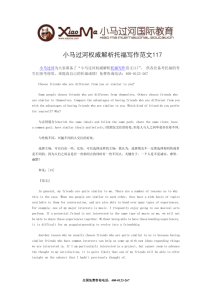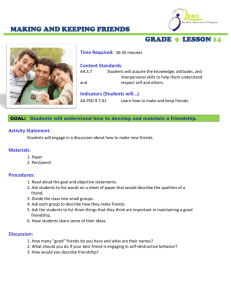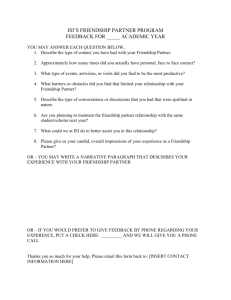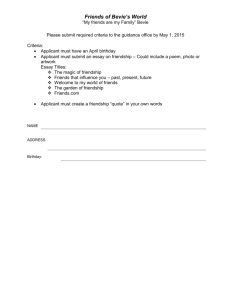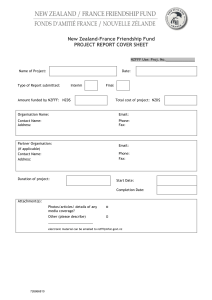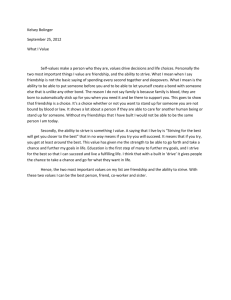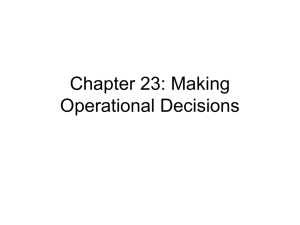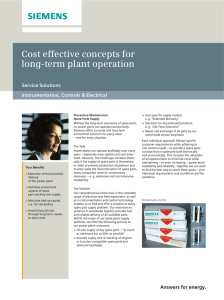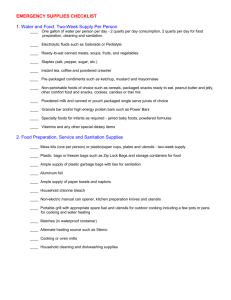STRATEGIC PLANNING-For the Good Life
advertisement
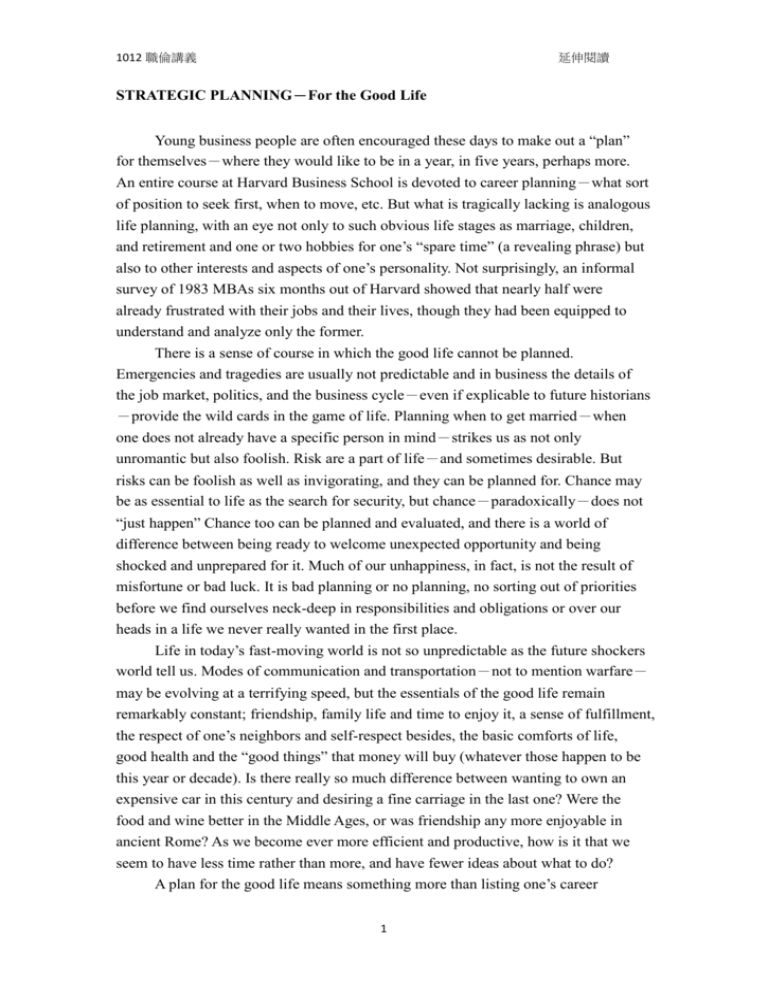
1012 職倫講義 延伸閱讀 STRATEGIC PLANNING-For the Good Life Young business people are often encouraged these days to make out a “plan” for themselves-where they would like to be in a year, in five years, perhaps more. An entire course at Harvard Business School is devoted to career planning-what sort of position to seek first, when to move, etc. But what is tragically lacking is analogous life planning, with an eye not only to such obvious life stages as marriage, children, and retirement and one or two hobbies for one’s “spare time” (a revealing phrase) but also to other interests and aspects of one’s personality. Not surprisingly, an informal survey of 1983 MBAs six months out of Harvard showed that nearly half were already frustrated with their jobs and their lives, though they had been equipped to understand and analyze only the former. There is a sense of course in which the good life cannot be planned. Emergencies and tragedies are usually not predictable and in business the details of the job market, politics, and the business cycle-even if explicable to future historians -provide the wild cards in the game of life. Planning when to get married-when one does not already have a specific person in mind-strikes us as not only unromantic but also foolish. Risk are a part of life-and sometimes desirable. But risks can be foolish as well as invigorating, and they can be planned for. Chance may be as essential to life as the search for security, but chance-paradoxically-does not “just happen” Chance too can be planned and evaluated, and there is a world of difference between being ready to welcome unexpected opportunity and being shocked and unprepared for it. Much of our unhappiness, in fact, is not the result of misfortune or bad luck. It is bad planning or no planning, no sorting out of priorities before we find ourselves neck-deep in responsibilities and obligations or over our heads in a life we never really wanted in the first place. Life in today’s fast-moving world is not so unpredictable as the future shockers world tell us. Modes of communication and transportation-not to mention warfare- may be evolving at a terrifying speed, but the essentials of the good life remain remarkably constant; friendship, family life and time to enjoy it, a sense of fulfillment, the respect of one’s neighbors and self-respect besides, the basic comforts of life, good health and the “good things” that money will buy (whatever those happen to be this year or decade). Is there really so much difference between wanting to own an expensive car in this century and desiring a fine carriage in the last one? Were the food and wine better in the Middle Ages, or was friendship any more enjoyable in ancient Rome? As we become ever more efficient and productive, how is it that we seem to have less time rather than more, and have fewer ideas about what to do? A plan for the good life means something more than listing one’s career 1 1012 職倫講義 延伸閱讀 ambitions and possibilities and something more than listing the things that one enjoys. A plan for the good life means, first of all knowing your needs, your ideals and aspirations as a human being. One joins a firm with business and management objectives in mind; it is not unreasonable to keep in mind also a set of life management goals. If one can set one’s sights on a promotion by the end of the first year, why not set a goal of friendship for that period, too? One might argue that in life “management by objective” is compulsive and neurotic-if indeed it is pursued in too businesslike a manner. But when business life is so carefully planned and orchestrated, the rest of life is too easily forced into the odd or spare moments, or neglected altogether. Strangely enough, the risks and shocks we think of as the challenge of business are reserved for our personal lives, where they are usually much less welcome. Ethics and the good life get sacrificed not because of immorality or stupidity but simply because they are not part of the only plan in town. What kinds of questions go into a plan for the good life? First of all, questions about yourself, what you want, expect, enjoy and need: security, freedom, companionship, privacy, power, friendship, great wealth, or just to be recognized as a success. 1. What do you consider the most important things in life? Success family, companionship, romantic love, money, status and position, respect, friendship. Which could you live without, or have only in small doses? Which could you not live without, or have only in substantial doses? 2. What do you most enjoy doing? Imagine yourself left entirely to choose on your own, without financial pressures, without expecting rewards or compensations beyond the activity itself. What would (or do) you choose to do? Listen to music? Play tennis? Build things? Have a quiet dinner with an intimate friend? Be alone, doing nothing? Work? 3. What kind of people do you like to spend your times with? Work with? Are they the kind of people you are spending times with now? Are you the kind of person they would want to spend time with? Do you enjoy people who inspire you? What are your primary expectations in a friend? In a colleague? In a boss? (Most of us conscientiously choose our subordinates; it is much more important to be careful in choosing a boss.) 4. How do you see yourself, ideally? How would you describe yourself in a paragraph, say, for a future Who’s Who emphasizing not positions and awards but character and accomplishments? How well are you working toward that now? 5. How important is so-called spare time to you? How much do you need? What do you (or would you) do with it? Is spare time to you just time to relax and get ready for more work? (Living to work used to be a virtue, until psychiatrists gave it a 2 1012 職倫講義 延伸閱讀 pathological name: “work-holism” But the fact remains that loving one’s work is one of the few dependable roads to happiness.) Is your spare time more important than your work? (Then why are you working so hard?) 6. Where world you draw the line in your job? What would you not do, even at the risk of being fired? Work seventeen-hour days, and weekends? Have to fire a good friend? Make false reports? Life to your boss? Get ahead at the expense of someone who deserves it more? Be responsible-even indirectly-even indirectly -for some innocent person’ death? (Better to be clear about these things before the topic comes up unexpectedly under pressure.) 7. What is your ethical style? What kinds of arguments do you use to support your ideas? What kind of person do you find immoral? Do you resent people who obey the letter of the law? Do you find people who don’t give arguments to be frustrating? 8. Whom do you want to please? (“Yourself” is the fashionable but usually false answer. “My mother” and “my father” are a bit overworked, thanks to Freud. Try again.) 9. How much money do you need? How much do you want? Why? Suppose you suddenly inherit $400,000. What would you do with it? Is that so important? 10. What do you want to be doing next year, this time, in your job and out of it? 11. What do you want to be doing five years from now-what kind of job, what kind of life? Does the idea of doing just what you are doing now (plus a little status and some cost-of-living increases) horrify you? Or does it give you a sense of pleasant comfort? 12. Looking back over your life and career from your rocking chair, what would you like to remember-and how would you like to be remembered? 3
